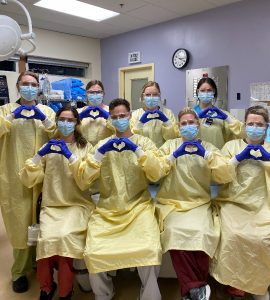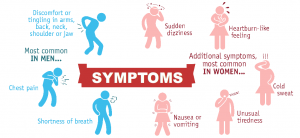Emergency Care

Heart attacks are a serious medical emergency, and delaying treatment can have serious consequences.
Evidence shows that treating heart attacks quickly will reduce heart damage. Heart attacks is a time-dependent condition where effective, life-saving treatments are regularly used, but they need to be applied very shortly after symptoms appear.
Know the Signs of a heart attack and call 9-1-1
Signs of a heart attack
- Chest pain or discomfort
- Sweating
- Upper body discomfort
- Nausea
- Shortness of breath
- Light-headedness
Don’t wait, call 9-1-1 if you or someone you know is experiencing symptoms, or visit your nearest hospital emergency room. The best choice is to go to the hospital in an ambulance. The paramedics can begin life-saving treatments even before you arrive at the hospital. If you are already on traveling, have someone drive you to the hospital right away. Do not drive yourself unless you have absolutely no other choice.
The Emergency Department at the Thunder Bay Regional Health Sciences Centre is a complex team of health professionals that work 24 hours a day, 7 days per week to provide emergency care to our community and region. These Emergency professionals care for a range of medical conditions including unstable angina, heart attacks and cardiac arrest needing life sustaining treatment.
The emergency team works carefully to treat patients and allow them to return home when appropriate but often has to admit patients to the inpatient units of our hospital for extended treatment. Cardiac patients in the emergency department are often admitted to the Cardiovascular and Stroke Unit (2C) for specialized cardiovascular care.
When it comes to cardiac care our emergency department works very closely with our local and regional EMS in identifying patients that need time sensitive treatment to cardiac medical emergencies. When patients are experiencing a heart attack the quicker we can get treatment, the better outcome the patient will often have. Each minute in delaying treatment leads to more damage of the heart muscle.
When the emergency team is notified by the EMS, they will start working before the patient even arrives by notifying the cardiac catheterization lab team and cardiologist of the patient’s condition. This communication is essential in expediting care and making sure the patient gets the best treatment as fast as possible.
Code STEMI Program
Time is muscle; the faster a cardiac event is discovered on an ECG, the better the treatment outcome.
The Code STEMI program links Superior North Emergency Medical Services paramedics and an interventional cardiologists within the Thunder Bay District 24 hours a day, 7 days a week.
With the Code STEMI program, an EMS paramedic can identify that a patient is having a severe heart attack based on the results of an electrocardiogram (ECG) – a test that checks for problems with the electrical activity of the heart. Once identified, the results can be transmitted to the interventional cardiologist in Thunder Bay who can quickly help diagnose patients having severe heart attacks and decrease treatment time for opening a blocked heart artery.
The interventional cardiologist can recommend an appropriate course of treatment tailored to each patient based on the best evidence available. Patients may be treated immediately by an EMS paramedic, emergency physician and/or be expedited for angioplasty – a non-surgical treatment that restores blood flow through blocked arteries performed in hospital by an interventional cardiologist.
Quickly opening the blocked heart artery is essential for promoting the best possible outcomes for patients having a severe heart attack. Involving all of the stakeholders streamlines the decision making in patient care, decreases time to treatment, and improves patient outcomes. The goal of the program is to treat patients having severe heart attacks in less than 90 minutes from first medical contact for angioplasty.
These treatment times are in accordance with the 2013 ACC/AHA guidelines endorsed by the Canadian Cardiovascular Society.
Signs for men, signs for women: Are they really different?
Women generally recognize the “Hollywood heart attack:” Chest-clutching, crushing pain.
If their pain is less severe, or if they have non-pain signs such as nausea, sudden fatigue or shortness of breath which are the signs more often reported by women, they are more likely to delay getting to emergency care, and once there, they are less likely to get fast, aggressive treatment. Recognize that all symptoms below can present in men and women yet these are most common but that everyone’s situation is unique.
